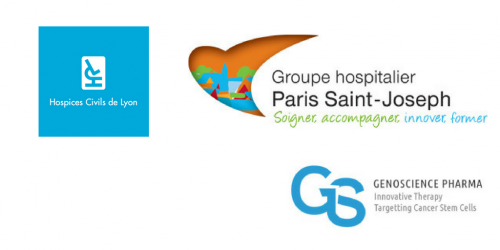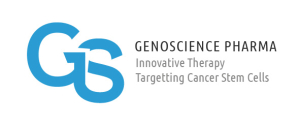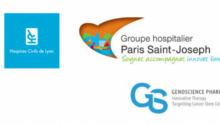Share this post:

Marseille, France, May 22, 2018 — Genoscience Pharma, a clinical-stage biotechnology company dedicated to discovering and developing anticancer drugs, announces today the extension to France of its first-in-human Phase 1b/2a clinical study using the oral small molecule GNS561 in advanced liver cancers (cholangiocarcinoma and hepatocellular carcinoma). GNS561 received an IND for a two-year international clinical trial involving up to 50 patients with liver cancer. It is small molecule, administered orally, with a new mechanism of action which works primarily by dysregulating zinc homeostasis in cancer cells and by inducing cancer cell death.
This international Phase 1/2a study, which began in April 2018 at the Jules Bordet Institute in Brussels, Belgium, will be performed in several European countries and the United States. It will evaluate the safety, activity, pharmacokinetic and pharmacodynamic properties of escalating doses of GNS561. Professor Ghassan Abu Alfa of Memorial Sloan Kettering in New York is co-principal investigator in the United States. Professor Ahmad Awada, head of the Department of Medical Oncology at the Jules Bordet Institute is the lead investigator in Belgium. The French study is led by Professor Philippe Merle, head of the Medical Oncology Department and principal investigator at Croix Rousse Hospital, Lyon, France.
Up to 36 patients will be enrolled in six cohorts during the escalation phase. Additional patients will be included in the continuous treatment phase to obtain a total of 20 evaluable subjects at the recommended dose.
“This approval from the French regulatory authorities (ANSM) for our clinical program represents a paradigm shift for our company. It expands our international clinical capacity and offers the opportunity to investigate GNS561’s potential for patients in France,” said Professor Philippe Halfon, president and CEO of Genoscience Pharma.
“We are pleased that our clinical program was quickly approved by the regulatory authorities in Belgium and France and by the institutional review boards and ethics committees in both countries. The first cohort of patients having been initiated in Belgium, we are now excited to continue our international evaluation of GNS561 by opening new centers in France. The enrollment and treatment of patients with advanced cholangiocarcinoma represents a new milestone for Genoscience Pharma,” said Professor Eric Raymond, chief medical officer.
“We are excited to be enrolling our first patient with GNS561. The mechanism of action of this novel anticancer agent offers great promise. We are hopeful that GNS561 will prove to be a significant and effective weapon against liver cancer, specifically for patients with cholangiocarcinoma for whom there are limited options beyond gemcitabine-platinum based therapy,” said Professor Philippe Merle, principal investigator.
About Cholangiocarcinoma
Cholangiocarcinoma (CCAs) is a heterogeneous group of bile duct cancers that arise from cholangiocytes that line the biliary tree. CCAs are classified based on their anatomic location, as follows: (1) intrahepatic CCA (iCCA), (2) perihilar CCA (pCCA) or (3) distal CCA (dCCA). iCCA represents 15% of CCA and is the second most common primary hepatic cancer, after hepatocellular carcinoma, with about 12,000 new cases every year in the US and in five combined European countries (France, UK, Italy, Germany, Spain, Belgium). In past decades, differing from overall cancer trends, iCCA incidence has more than doubled worldwide and its mortality rates have been escalating with a 39% increase. It is predicted to keep dramatically progressing due to a sedentary lifestyle, exposure to chemicals and an ageing population. Due to the late appearance of symptoms and late diagnosis, the tumour is unresectable in 60 to 70% of cases; patients are only eligible for chemotherapy. Systemic chemotherapy options are critically limited: the standard practice is the first-line use of platinum and gemcitabine combinations, which leads to on average only a moderate overall survival benefit of 11.7 months. To date, despite numerous studies, no second-line treatment is recommended in clinical guidelines as no benefit from the further use of chemotherapy, targeted therapy and immunotherapy was observed.
About GNS561
GNS561 is a novel Solute Carrier Transporter (SLCT) inhibitor demonstrating potent antitumor activity against a range of human cancer cell lines, including HCC. It also shows activity in cell lines resistant to current standard-of-care treatment options for HCC. GNS561 is an orally bioavailable compound initially being developed for the treatment of primary liver cancer, including advanced HCC. It is also being investigated preclinically in other solid tumors.
About Genoscience Pharma
Genoscience Pharma is a clinical-stage pharmaceutical company, focused on the discovery and development of novel small molecule anticancer therapeutics, including novel Solute Carrier Transporter inhibitors, to improve cancer treatment and clinical outcomes for patients. Genoscience Pharma plans to develop its products internationally, particularly in Europe, the US and Asia.
Forward-Looking Statements
This press release may involve and contain forward-looking statements by the company about its product candidate GNS561, including its potential benefits. Such statements are based upon the current beliefs and expectations of Genoscience Pharma’s management and are subject to risks and uncertainties that could cause actual results to differ materially from those expressed or implied by such statements. Risks and uncertainties include, but are not limited to: additional financing, the company’s ability to implement its chosen strategy, dependence upon third parties, other risks and uncertainties inherent in research and development, including the possibility of unfavorable study results, changes in the competitive environment, changes in regulations, clinical or industrial risks and all risks linked to the company’s growth. There are no guarantees that future clinical trials will be completed or successful or that any Genoscience Pharma therapeutics will receive regulatory approval for any indication or prove to be commercially successful. While those factors presented here are considered representative, no such list should be considered to be a complete statement of all potential risks and uncertainties. Unlisted factors may present significant additional obstacles to the realization of forward-looking statements. Forward-looking statements included herein are made as of the date hereof; Genoscience Pharma does not undertake any obligation to update such statements to reflect subsequent events or circumstances.





